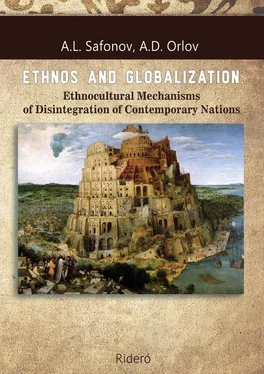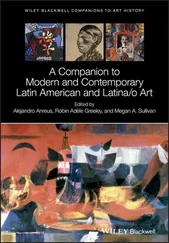The growth in the number of conflicting sides, typical of contemporary times, the appearance of new dimensions and trans-border connections, and the deepening of contradictions are emphasized by the well-known concept of controlled chaos, reflecting the essential characteristics of globalization as a systemic crisis. This chaos is characterized by the existence of many points where one has to make a choice (bifurcation) during the historical process, with potential governability of such chaos through weak pressure on critical points and processes being another attribute.
In other words, governing the chaos is nothing but governing the flow of crisis situations as special vulnerable points within the social process with consequent purposeful interference of third parties in the resolution of crises, which may be defined as a variant of the multi-crisis approach to global governing.
What may be gained from the multi-crisis approach to globalization as a system of interconnected sub-crises, transforming the world-system that was formed by the end of the twentieth century?
Above all, the model of the development of globalization, as the mutual influence of various sub-crises, gives an adequate idea of the systemic difficulty of globalization, its off-balance and catastrophic dynamics, its ability to give way to qualitatively new social phenomena and agents, first of all challenges and threats. Such a view of globalization as a system of global crises and one catastrophe giving way to another, a system born not so much out of the growth limits of the resource base as the explosive growth of global interconnectedness, allows us to overcome the limited nature of theoretical approaches formed in the last century, understanding the systemic regression of the basics of contemporary civilization as growth expenditures. The very concept of growth, understood as the exploration of the resources of the outside environment, loses its meaning in the situation of fundamental resource limits.
As a result, the multi-crisis model of globalization acknowledges the end of the era of incremental socioeconomic progress, with humankind transitioning to a lower branch of regressive development, from steady growth to self-preservation under the conditions of total instability and antagonism. It means the loss of the most important social opportunities and achievements of the industrial era, at the very least.
An important indicator of social regression is the archaization of social relations and the mythologization of collective consciousness, the increase in the importance of ethnic and religious feelings, or the ethnicization and clericalization of the politics. The fight for the redistribution of resources and minimization of losses is becoming the core of the global process in the situation of the global conflict of civilizations.
The narrowness of the growth limits predicated on the scarcity of resources moves humankind into the territory of self-recycling, where outsider agents – including not only peripheral states, but, first of all, multiple influential strata in developed countries, including the middle class as their social basis – become the chief source of resources for the development.
The era of systemic progress and growth is finishing: the time is coming for an inevitable descent as competition grows.
As a result, the limitation of the resource base gives way to the degradation and primitivization of system-building social institutions, the formation of circles of steadily depressive regions and settlements as the concentration of resources in one sphere requires taking resources from other spheres of existence.
From the point of view of ensuring steady development, it is important that one addresses the issues of interference, mutual strengthening, synergy of crisis processes, the appearance of cause-and-effect ties between crisis processes, the export and outflow of social catastrophes and the phenomenon of their synchronization (the domino principle, trigger process, cascading catastrophes).
It is important to note that crisis processes in separate spheres, like systemic malfunctions in medicine, may provoke or strengthen, but not compensate for one another. Strengthening of the crisis in separate spheres of existence, or regions, may strengthen or provoke crisis processes in linked areas, resulting in the crisis becoming uncontrollable and then entering into the realm of catastrophe. Thus, the phenomenon of synchronization and generalization of local crisis processes that may result in the transition of local crises into a global systemic catastrophe is obvious.
The problem of the synergy and interaction of global sub-crises is characterized, too, by the instantaneous and global nature of digital communications. The lifting of spatial barriers objectively leads to the acceleration of social processes whose development outstrips their study and, as a consequence, does not give way to the possibility of purposeful governing and regulation.
The model of globalization proposed in the current work, presenting it as a dynamically unstable system of interacting global crises, creates a basis for understanding and forecasting social dynamics of the global crisis, removing the methodological limitations of economic determinism.
Moving past economic determinism demonstrates that globalization is not an objectively pre-arranged approach of humankind towards the only possible equilibrium. It also represents a global crisis, the establishment of a development which engenders major, often catastrophic and essentially unpredictable, social transformations connected to the establishment, development and death of a wide range of social agents in the course of a global conflict that is no longer limited by spatial borders.
Having taken in all the available world, global social system continues to develop, maintaining an unreducible complexity and creating within itself new social structures and agents, thus creating the definite possibility and bifurcation of the historical process.
Therefore, the main consequence of maintaining the inner complexity, multipolarity and multi-agency of the world-system is the indisputable ungovernability of the sociohistorical process, reaching its maximum during historical crises.
At the same time, the systemic difficulty and variability of globalization against the backdrop of an increasing lack of vitally important resources and increasing competition among the actors in global politics means a heightened risk of catastrophe for humankind in general, as well as for a wide range of social agents, with ethnic and national communities undoubtedly being the most important among them.
1. The ontologistic nature of globalization, as the leading modern phenomenon, is essentially impossible to reduce to economic phenomena given the establishment, development and major increase in the interconnectedness of the global economic, political, informational and social environment. The unity and interconnectedness of the contemporary world intensifies the interaction and antagonism of all social agents, taking on the form of a multi-dimensional, connected and therefore increasingly unstable system of interacting crises powering one another. This engenders a qualitatively new level of complexity and the dynamics of the establishment and development of modern social phenomena.
2. Globalization, as a qualitatively new form of interaction of social agents, leads to contradictions transitioning into new social forms, differing greatly from the forms typical of the industrialized era.
3. Well-known theories and approaches to globalization do not fully explore the reasons, scale and consequences of the ethnic fragmentation of the social community typical of contemporary times and of the crisis of the contemporary nation. This is related to the fact that the majority of contemporary theories and concepts of globalization are characterized by absolutization of convergent aspects of development, tendencies for global ethnocultural unification and the denial of social regression as an objective tendency, an attribute of globalization.
Читать дальше












